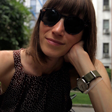We believe in the power of routines and finding meaning in the ways we sew comfort into our everyday surroundings. Drop Ins is a series that explores just that, taking a dressed-down look at the lives of people who inspire us.
Gillian (aka Gigi) Sagansky has worn many professional hats: as a writer and journalist for several fashion publications like W Magazine and Vogue, DJ, and now podcast host. It’s her latest pursuit, however, that skews closest to home.
On Driven Minds by Type 7, the podcast she launched in December 2020, Sagansky invites accomplished individuals in various fields of expertise, including Arianna Huffington, Brian Grazer, and Tyra Banks to share how they’ve navigated through various mental health challenges, while also relating her own experiences living with obsessive-compulsive disorder (OCD). “It’s 2021. We are witnessing so many important sociocultural shifts, but mental health still feels so stigmatized and stuck in the past,” Sagansky says. With Driven Minds, she’s wholly dedicated to changing how we talk about those things.]
We checked in with Sagansky, who’s currently installed in Manhattan’s Greenwich Village (she lives between Berlin, and NYC, where she grew up), to see how she’s coped through this very unusual, uncertain past year, the routines she steadfastly maintains, and her love of baths and avocados (yes, both together!).
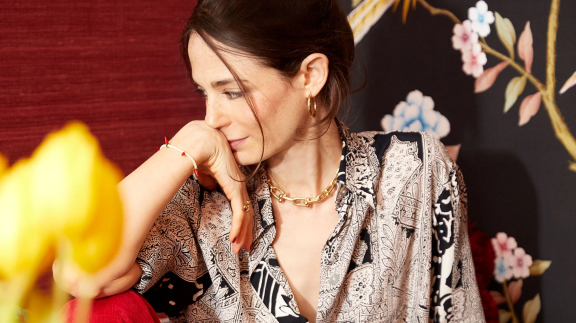
I didn’t feel I was making the kind of impact I wanted to make when writing for fashion magazines. I was tired of being assigned articles I didn’t want to write, about subjects I didn’t care about, just for clicks and eyeballs. I wanted to switch gears and make a difference in the world, so I thought about which social cause resonated with me the most, and mental health felt like my calling, due in part to my lifelong struggle with OCD.
I was diagnosed with OCD and ADD when I was ten, heavily medicated for years, and felt like a complete outsider for a long as I can remember. In a child’s mind, you take pills to get better. But I couldn’t see what was wrong with me, which led to all this shame and confusion. It’s like the adults knew something was wrong with me that I didn’t, and that was really hard to grapple with. The shame and OCD worsened over the years, and it got to a point where I didn’t want to live the way I was living anymore. I felt like a prisoner of my own mind, and I realized I had to take a radical step.
I left Conde Nast and dedicated 2019 to self-care; I went to McLean psychiatric hospital in January 2019 to deal with the OCD, and then I went to the Hoffman Institute, and also found a wonderful therapist.
The biggest takeaway from that year was twofold; first, I learned that I have the power to transform my mind, and second, the importance of talking about our mental health struggles with others. A mental health podcast felt like the right next step, so I pitched my idea to a podcast start-up and then we partnered with Type 7, the editorial platform of Porsche, to bring the idea to life.
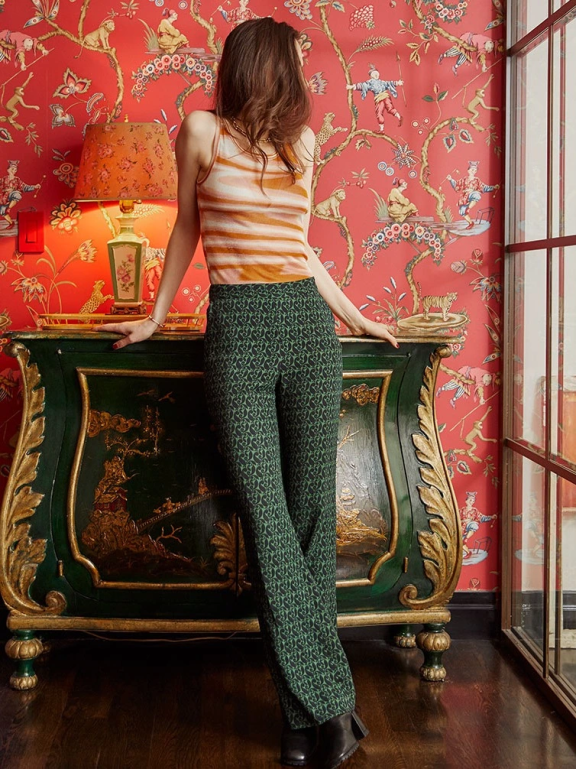
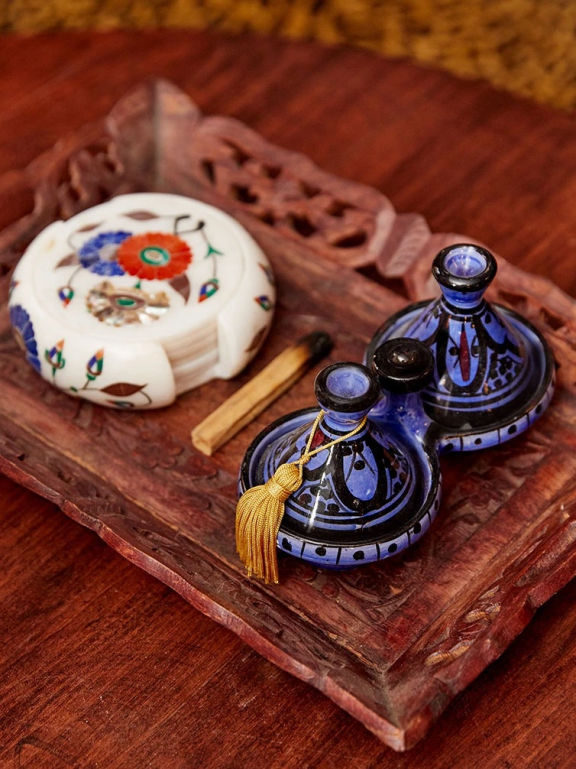
The language and rhetoric around mental health can be so much more detrimental than helpful. I think tacking on the word “disorder” to a mental struggle just serves to reinforce the existing stigma. Why does obsessive compulsion have to qualify as a disorder? It has such a pejorative connotation, why? Yes, OCD can be debilitating, but I’ve also learned the power of having OCD, and the ways in which I can make it work in my favor. If I can obsessively remember license plates and how many times I locked my front door today, then I can remember languages and the order of the US presidents. I feel the same way about the term "mental illness" and always have. This isn’t meant to minimize the struggle that someone is going through, and I know a lot of people feel mental illness is a helpful descriptor. But I never want to be called mentally ill. I am mentally strong.
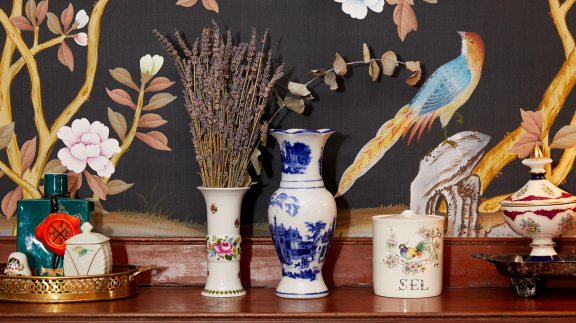
No, that secret was in a lockbox! With OCD came all of these rituals and compulsions that I couldn't even rationalize myself — I couldn’t not touch something a certain amount of times, otherwise I would think something bad would happen. My compulsions were bigger than me. It wasn't until I went away to McLean and deleted social media that I started talking about what I was going through — slowly.
My friends started to check in as to where I was, and eventually, I told them about my OCD, and that I was getting help at a hospital. The beautiful part was that each one of them shared their own story of mental struggle, and it was so powerful and healing for both of us to have this conversation we somehow have never had despite years of friendship. We’re told that vulnerability is associated with weakness, and it’s not okay to be sad, unhinged, or broken. So we show the best versions of ourselves, but it’s hard to genuinely connect with people when we’re unwilling, out of fear, to be vulnerable. And I was totally there. I held onto those external markers of “editor” and “DJ” so heavily, to justify how cool and okay I was. I was struggling at such a high cost to appear functional.
Not at all! At first, I would tell my friends I was on a mindfulness retreat. Even though I had been friends with many of them for decades, I was petrified of judgement. Then I wondered, ‘Why am I perpetuating my own shame here?’ The only way to render shame obsolete is to talk about it and I was so tired of not owning my own story. The more I opened up about my story, the more my friends opened up about theirs. There was no pity, no shame, and I was so heartened and fueled by that.
When I first left McLean, one of my best friends Brooke DeVard, who is the host of Naked Beauty podcast, invited me on to tell my story. I said yes for me—just to tell my story out loud and free myself from the shackles of my own shame. It might not seem like a big deal, but saying I had OCD out loud, to the public, was the most radical thing I ever thought I could do. Tons of people heard the episode, listeners were DM-ing me, emailing, and going through these various steps to find me online. I’m not a public figure, so if people are seeking me out because they heard me on a podcast, imagine how many people need help—and someone to talk to. Thus, Driven Minds was born months later!
Oof — I’m having a hard time with the male presence on the podcast, lemme tell you. I get so excited to talk to women and hear their stories, but I want to level out [our guests] a bit. Most men tend to be more reserved when it comes to talking about the inner workings of their minds — I blame patriarchal conditioning. I just really love women, and supporting women, and women supporting women. But anyway we’ve booked some great men and I am also really excited to get non-binary people on the show!
Because of my anticipatory anxiety, I’ll over-research to my detriment. The element of genuine surprise is crucial, and sometimes I’ll know the guest’s stories before they tell them. For the first time, I’m realizing you can in fact overdo it with research. It's been a learning process — but I love it!
I've never been a fan of routines, but I really fell into them during COVID and now I'm a routine devotee. I’m a huge proponent of CBD; I’ve taken it for sleep, anxiety, and period pain, and it has worked wonders. I have chronic back pain from scoliosis, so I get acupuncture once a week. That’s definitely crucial to my wellness routine.
I go outside to the park at least once a day for a walk, ideally with my phone at home. Taking breaks from blue light really rejuvenates my brain. I really feel the effects of it. I also do Pilates about four or five times a week. Physical exercise is fascinating because you can’t be anywhere else, mentally, and Pilates is so detail-oriented, you need to be fully present in order to execute. It's an absolute mind and body reset.
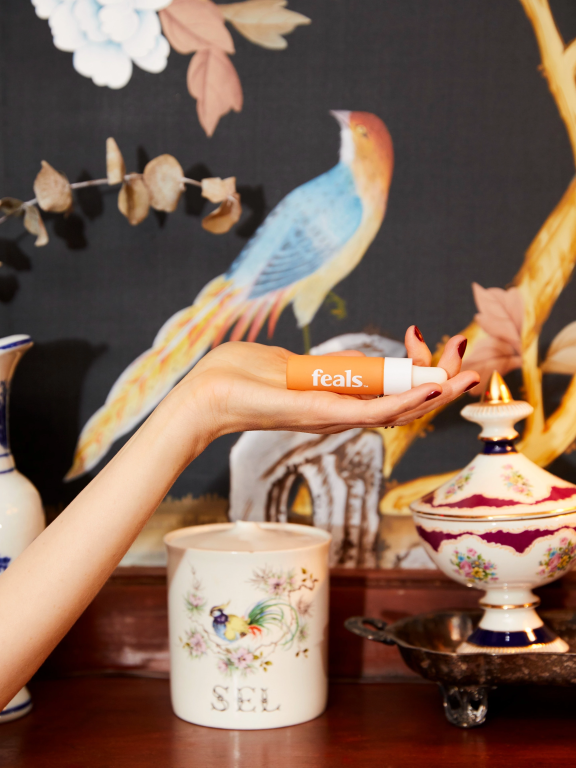
Speaking of, I can’t recommend it enough—the Waking Up app by Sam Harris. I do his ten-minute meditation every single day. Meditation is really intimidating for me, but I find his approach to meditation really accessible and helpful, so his app got me started on my meditation journey.
I spend most of my day fantasizing about my end-of-day bath. It is an electronic-free zone and the one place I can read, and fully be with myself without distraction. I smear Manuka honey all over my hair and face and just cook in hot water for an hour. It’s my messy bliss!
I eat a whole avocado. I have a little thing of seal salt or black salt on the side, and I’ll just sprinkle it on as I go through it with a spoon. I don’t understand how you can have an avocado, eat half of it, and put the other half in the fridge to get brown and cold. I don’t understand those people!
Gigi was photographed by Kimber Capriotti at her apartment in New York City on April 29, 2021. Subscribe to her podcast, Driven Minds, wherever you most frequently listen.
